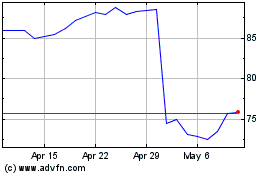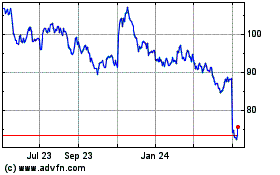Wal-Mart to Increase Wages for Most U.S. Store Workers
January 20 2016 - 2:30PM
Dow Jones News
Almost everyone who works at a Wal-Mart in the U.S. will get a
raise in February, as the country's largest private employer
battles chronic turnover and a tighter labor market.
Wal-Mart Stores Inc. said it would increase wages for most of
its 1.2 million U.S. store employees on Feb. 20. The company
previously announced plans to lift its minimum wage to $10 on that
date, and now Wal-Mart says all hourly workers employed in stores
as of Dec. 31 will get at least a 2% pay bump.
Wal-Mart is making the change to address concerns raised by some
long-time workers, who complained about the more-generous starting
wages for new hires. The company is also trying to stem defections
and the amount of money it spends to hire and train new staff.
Wal-Mart loses hundreds of thousands of store workers each year, a
Wal-Mart executive said last October.
Minimum-wage increases took effect in 20 states last year and
several of the biggest employers of hourly workers, including
McDonald's Corp. and Starbucks Corp., have also lifted their
starting pay. Average hourly earnings for retail workers was $14.95
in December, up 3.6% from a year earlier. With the February changes
the average full-time Wal-Mart employee will earn $13.38 an hour,
the company said.
In April Wal-Mart raised its minimum wage to $9 an hour,
sparking complaints from some employees that they made nearly the
same as a new hire with less experience, says Judith McKenna,
Wal-Mart U.S. chief operating officer. This time Wal-Mart wanted
all employees to benefit at once and to clearly communicate the
change, she said.
"That doesn't mean that we still won't have compression in the
organization," says Ms. McKenna, referring to when rising minimum
wages shrink wage differences for more senior employees. Still,
last April's experience taught Wal-Mart executives that employees
want to know "they will still be ahead of those who come from an
entry level position," says Ms. McKenna.
To achieve one day of company-wide raises, Wal-Mart will move
the typical 2% annual pay increase to Feb. 20 instead of granting
the increase on store workers' date-of-hire anniversary. Employees
that have reached a wage cap will get a one-time payment equal to
2% of salary.
Store employees were told of the change Wednesday morning.
In October company executives said wage increases would cost
about $2.7 billion over fiscal year 2016 and 2017, driving down
next fiscal year's profit by as much as 12% and depressing the
company's share price. The 2% wage increase is included in that
figure, said Ms. McKenna.
Write to Sarah Nassauer at sarah.nassauer@wsj.com
(END) Dow Jones Newswires
January 20, 2016 14:15 ET (19:15 GMT)
Copyright (c) 2016 Dow Jones & Company, Inc.
Starbucks (NASDAQ:SBUX)
Historical Stock Chart
From Mar 2024 to Apr 2024

Starbucks (NASDAQ:SBUX)
Historical Stock Chart
From Apr 2023 to Apr 2024
